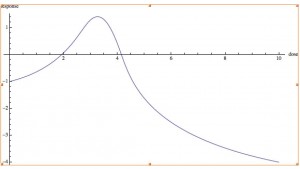Antifragile: Things That Gain From Disorder by Nassim Nicholas Taleb looks at life according to a Stoic philosophy which is indifferent to pleasure or pain. The concept of antifragility domesticates uncertainty and examines the future with a robust rationality devoid of too much emotional attachment.
The main thrust of antifragility teaches that systems benefit from stress and uncertainty. The Stoic sage transforms fear to prudence and pain to information.
Every good doctor investigates the source of pain. This is true because valuable information can be gleaned in order to arrive at a correct diagnosis and treatment regimen.
Taleb teaches that major systems benefit from stress, disorder, volatility and turmoil. Essentially, the absence of challenge degrades the best performers because they cannot grow due to atrophy from disuse of their talents and skills.
In fact, barricades can enhance strength from the monumental effort needed to break them down. The only problem here is the stress on the individual which extracts costs to society later on.
Monthly Archives: January 2013
Nassim Taleb’s ‘Antifragile’ Celebrates Randomness In People, Markets – Forbes
But in Antifragile, Taleb goes beyond this “square peg in a round hole” argument to a larger critique of “soccer moms” (both figurative and literal) who naively attempt to make the world safer by “sucking randomness out to the last drop.” Doing this provides the illusion of safety while actually making us less resilient and more fragile. In other words, not only are scraped knees and bruises ok, they are an essential part of growth.
Many readers misunderstand Taleb’s core message. They assume that because Taleb writes about unseen and improperly calculated risks, his objective must be to reduce or eliminate risk. Nothing could be further from the truth.
If anything, Antifragile is a celebration of risk and randomness and a call to arms to recognize and embrace antifragility. Rather than reduce risk, organize your life, your business or your society in such a way that it benefits from randomness and the occasional Black Swan event.
via Nassim Taleb’s ‘Antifragile’ Celebrates Randomness In People, Markets – Forbes.
Expansion on Book IV of ANTIFRAGILE
(Expansion on Book IV of ANTIFRAGILE)
A drivers license is something binary: Pass/Fail. Nobody is foolish enough to try to get high scores in it to improve his CV with a “drivers license from the prestigious center X, summa cum laude”. We understand the nonlinearity there; and we get the point that failing the test makes one a bad driver on the road, but better grades at the test won’t necessarily make one a better driver. It is an entirely via negativa statement; failing (the negative) is where the information resides, where school knowledge may map to reality. The necessary is not to be confused with the causal.
Now try to translate the idea into other areas of education. The statement “failing to get a degree is bad for you” does not necessarily mean that “better grades are good”. It may even mean that higher grades might indicate a sick mind. This is the difference between SATISFICING and OPTIMIZING. An ecologically calibrated person, aware of the fuzziness of the mapping betwen education and skills, should be able to aim for just pass, and not be penalized by the nerd wasting time on fitting his brain cells to the exam at the expense of other skills and activities, such as street fights, reading Montaigne, or meditating under a tree. Given that university knowledge does not map to true knowledge, to protect people from themselves, university degrees should never be anything but binary, without the fluff “honors, shmonors”, etc.
(Anything that caps the variable and prevents scoring should work.)
via Timeline Photos.
Did Davos Steal Its Theme From an Author Who Hates Davos? – Global – The Atlantic Wire
The big idea guiding this year’s World Economic Forum in Davos, Switzerland is “Resilient Dynamism.” That might not mean much to rubes like us, who don’t get invited to schmooze with other plutocrats and chat amicably about the state of global economy. But to the thought leaders who pay close attention to these summits, Davos 2013’s vague headlining idea sounds a lot like another vague idea forwarded by Nassim Taleb. And if WEF organizers did in fact lift their theme from Taleb’s work, we’re guessing the author who famously hates Davos is none too happy.
via Did Davos Steal Its Theme From an Author Who Hates Davos? – Global – The Atlantic Wire.
Natural disasters: Counting the cost of calamities | The Economist
Referenced in Antifragile pg. 470
Such multi-billion-dollar natural disasters are becoming common. Five of the ten costliest, in terms of money rather than lives, were in the past four years see map. Munich Re, a reinsurer, reckons their economic costs were $378 billion last year, breaking the previous record of $262 billion in 2005 in constant 2011 dollars. Besides the Japanese and Thai calamities, New Zealand suffered an earthquake, Australia and China floods, and America a cocktail of hurricanes, tornadoes, wildfires and floods. Barack Obama issued a record 99 “major disaster declarations” in 2011.
via Natural disasters: Counting the cost of calamities | The Economist.
